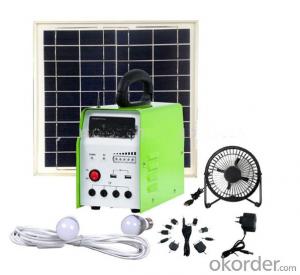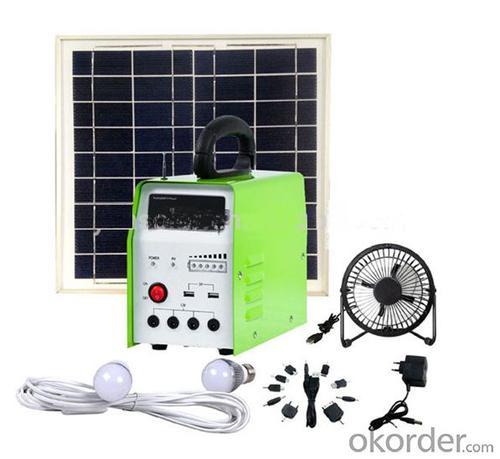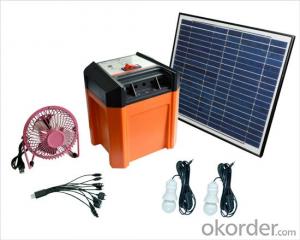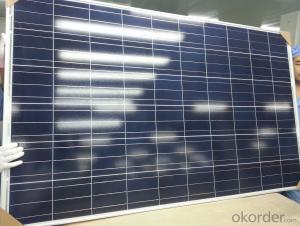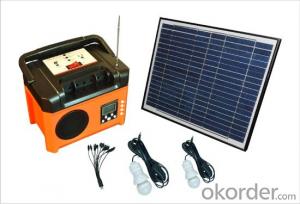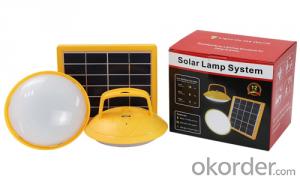Solar Energy Systems Dallas TX - DC Solar Light System with Radio for Home Use
- Loading Port:
- Shanghai
- Payment Terms:
- TT or LC
- Min Order Qty:
- 300 watt
- Supply Capability:
- 200000 watt/month
OKorder Service Pledge
OKorder Financial Service
You Might Also Like
| Quick Details | |||||
| Specification: | Mini | Application: | Home | Output Voltage (V): | 12V DC & 5V DC |
| Load Power (W): | 10W | Solar Power (W): | 10W | Work Time (h): | About 28 hours |
| Color: | White+Green | Dimension(mm): | L240 x W130 x H215 | Net weight(kg): | 4.25 |
| Packaging & Delivery | |||||
| Packaging Detail: | Standard export package or according to customer's requirement. | ||||
| Delivery Detail: | 15-20 work days depending on order quantity | ||||
Mini Solar Home Light Systems
Mini solar home light system includes Solar cell modules, solar battery, solar controller , LED lamps and USB charger cable. It is one system which is special designed to meet customers' demand of electricity when they go to camping or there’s no lights. It can be applied to any areas that electricity is in short supply. Use very widely. It can charge for Cell phones, lights, mp3 and other DC charging products.
Product Features:
Environmental protection: solar product does not produce pollutants, without noise, create a green, clean, comfortable living environment.
Convenience: It is featured with compact configuration, small in size, light in weight and easy to carry.
Main Functions:
1. Built in FM radio and MP3 player
2. Battery power indicator
3. Overloading protection
4. Overvoltage protection
5. Overheat protection
6. Short circuit protection
7. 4* DC12V output and 2* 5V USB output
Specifications:
Model | ISS10-7Q-R |
Solar panel power | 18V 10W(8m solar cable) |
Battery capacity | 12V 7AH (lead acid) |
Solar panel charging time | 5.5 hours (effective sunlight) |
DC Output | 4*12VDC terminals / 2*5V(500mA) USB |
FM radio & Mp3 player | Yes |
Certificate | CE & RoHS |
Dimensions of system box | L240*W130*H215mm |
Net weight of system box | 4.25Kg |
Appearance color | White + Green |
Dimensions of solar panel | L355*W285*H17mm |
Net Weight of solar panel | 1.25Kg |
Dimensions of battery | L150*W65*H95mm |
Net Weight of battery | 2.0Kg |
Products guarantee as below:
Main machine guarantee time: 1 year limited warranty (lifetime: more 10years)
Battery guarantee time: 1 year (lifetime: 2-3years)
Solar panel guarantee time: 5 years
OEM/ODM available:
Tell us the requirements and price range you desire, we will bright you best performance product against your budget.
Loads and use time reference:
| Load | Load Power | Duration of single load | Remarks |
| LED lamps | 3 Watt * 2 | Appr. 18H | Different Location, different charging time. |
| 2 Cell phones | 2.5 Watt * 2 | Appr. 20H | |
| A mini fan | 2.5 Watt | Appr. 40H | |
| All above | 13.5Watts | Appr. 8H |
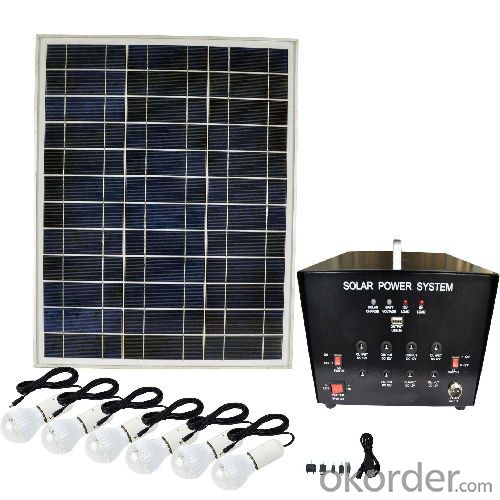
- Q: What is the role of solar energy forecasting in grid integration?
- The role of solar energy forecasting in grid integration is vital for effectively managing the integration of solar power into the electrical grid. Solar energy forecasting provides accurate predictions of solar power generation, enabling grid operators and energy market participants to plan and optimize the operation of the grid. Solar energy is intermittent and variable, as it depends on weather conditions and the position of the sun. Therefore, accurate forecasting of solar power generation helps grid operators to anticipate fluctuations in solar energy supply and plan for potential imbalances between supply and demand. Grid integration of solar energy requires balancing the variability of solar power generation with the overall electricity demand. Solar energy forecasting plays a critical role in this process by providing real-time predictions of solar output, allowing grid operators to adjust other sources of power generation or storage to maintain grid stability. Moreover, solar energy forecasting is essential for the effective utilization of solar power in energy markets. Accurate forecasts enable energy market participants to optimize their trading strategies, determine the optimal dispatch of power generation assets, and manage their portfolio effectively. This helps to reduce the cost of integrating solar energy into the grid and enhances the overall economics of renewable energy. Additionally, solar energy forecasting contributes to the efficient operation of grid infrastructure. By providing accurate predictions of solar power generation, grid operators can plan the deployment and operation of transmission and distribution infrastructure, ensuring that it can handle the increasing penetration of solar energy without compromising grid reliability. Overall, solar energy forecasting plays a crucial role in grid integration by providing accurate predictions of solar power generation, allowing grid operators and energy market participants to effectively manage the integration of solar energy into the electrical grid, optimize energy trading strategies, maintain grid stability, and efficiently operate grid infrastructure.
- Q: Can solar energy systems be used for powering electric scooter charging stations?
- Solar energy systems have the capability to power electric scooter charging stations. The installation of solar panels on the rooftop or in an open area adjacent to the charging station enables the capture of sunlight, which is then converted into electricity. This eco-friendly and renewable energy source can be utilized to charge the scooters, consequently reducing dependence on grid electricity and decreasing carbon emissions. Moreover, by integrating energy storage solutions like batteries, excess energy generated during the day can be stored for use during periods of low sunlight or at night. This ensures an uninterrupted and dependable power supply for the charging stations. All in all, the utilization of solar energy systems for electric scooter charging stations presents a sustainable and environmentally conscious alternative.
- Q: Are there any government incentives for installing solar energy systems?
- Yes, there are several government incentives available for installing solar energy systems. These incentives include federal tax credits, state and local rebates, grants, and loan programs. These incentives aim to promote the use of renewable energy sources and help individuals and businesses offset the costs of installing solar panels.
- Q: Are there any environmental benefits to using solar energy systems?
- Yes, there are several environmental benefits to using solar energy systems. Firstly, solar energy is a renewable source of energy that harnesses the power of the sun, which means it does not deplete natural resources or contribute to climate change like fossil fuels do. Additionally, solar energy systems produce no greenhouse gas emissions during operation, reducing air pollution and improving air quality. They also have a minimal water footprint compared to other energy sources, helping to conserve water resources. Overall, solar energy systems help mitigate the negative impacts of traditional energy generation on our environment.
- Q: Can solar energy systems be used in powering recreational facilities like gyms or spas?
- Certainly, solar energy systems are an excellent choice for powering recreational facilities such as gyms and spas. In fact, many of these establishments have already embraced solar energy as a sustainable and cost-effective solution for their energy requirements. The installation of solar panels on the roof or in close proximity to the facility allows for the capture of sunlight and its conversion into electricity. This clean and renewable energy source can then be utilized to power various equipment, including lighting, air conditioning, heating, and other electrical systems within the facility. By incorporating solar energy systems, recreational facilities can significantly reduce their dependence on traditional energy sources, such as fossil fuels. This not only contributes to the reduction of carbon emissions and the fight against climate change but also provides long-term financial advantages. Over time, solar power can result in substantial energy savings, as gyms and spas have the potential to generate their own electricity and even sell any excess power back to the grid. Furthermore, solar energy systems can be seamlessly integrated into the design of recreational facilities. The sleek and modern appearance of solar panels can enhance the overall aesthetic appeal of the facility, while also showcasing its commitment to environmental sustainability. This can attract environmentally conscious customers who appreciate businesses that prioritize renewable energy and contribute to a greener future. In conclusion, solar energy systems are a viable and increasingly popular option for powering recreational facilities like gyms and spas. By harnessing the power of the sun, these facilities can reduce their carbon footprint, save on energy costs, and attract environmentally conscious customers.
- Q: What is the role of combiners in a solar energy system?
- The role of combiners in a solar energy system is to efficiently manage the flow of electricity generated by multiple solar panels. A combiner box or a combiner panel is typically installed near the solar panels and acts as a central junction point for the individual DC (direct current) outputs from the panels. One of the primary functions of a combiner is to combine or merge the DC outputs from multiple solar panels into a single DC output. This consolidated output is then sent to the inverter, which converts the DC electricity into AC (alternating current) electricity that can be used to power homes or businesses. Combiners also play a crucial role in ensuring the safety of the solar energy system. They often include overcurrent protection devices, such as fuses or circuit breakers, to prevent damage to the system in case of a short circuit or overload. By integrating these protective devices, combiners help in preventing potential electrical hazards and maintaining the longevity of the solar panels and other system components. Additionally, combiners may also include monitoring systems that allow users to track and analyze the performance of individual solar panels or the entire system. This monitoring capability helps in identifying any issues or malfunctions in the system, enabling timely maintenance or repairs to optimize the system's efficiency and output. In summary, combiners are essential components in a solar energy system as they consolidate the DC outputs from multiple solar panels, provide overcurrent protection, and enable system monitoring. Their role ensures efficient electricity distribution, system safety, and facilitates performance monitoring for optimal functioning of the solar energy system.
- Q: Can solar energy systems be connected to the existing power grid?
- Solar energy systems can indeed be linked to the current power grid, known as grid-tied or grid-connected solar systems. In this configuration, solar panels harness sunlight to generate electricity, which is then converted by inverters into usable AC power. This AC power is then integrated into the existing power grid, effectively supplementing the utility company's electricity supply. Grid-tied solar systems provide multiple advantages. Primarily, they allow homeowners and businesses to decrease their dependence on fossil fuel-based electricity and reduce their carbon footprint. Moreover, any surplus electricity generated by the solar panels can be returned to the grid, resulting in net metering or feed-in tariffs. In this scenario, the excess power is credited to the system owner by the utility company, leading to substantial cost savings or even potential revenue generation. Furthermore, grid-tied systems ensure a reliable and consistent supply of electricity. During periods when the solar panels are unable to generate sufficient power, such as at night or during cloudy weather, electricity can be acquired from the grid. Conversely, when the panels produce more electricity than is being utilized, the surplus is sent back to the grid, guaranteeing an uninterrupted and continuous power supply. It is important to acknowledge that the installation and connection of grid-tied solar systems may necessitate the approval and coordination of the local utility company, as well as adherence to pertinent regulations and safety standards. Nevertheless, the capability to connect solar energy systems to the existing power grid renders them a versatile and advantageous renewable energy solution.
- Q: Can a solar energy system be installed in an apartment or rental property?
- Yes, a solar energy system can be installed in an apartment or rental property. However, there are a few considerations to keep in mind. Firstly, you need to check with your landlord or property owner to see if they are open to the idea of installing a solar energy system. Some landlords may be supportive of green initiatives and may even be willing to help with the installation costs. Others may have restrictions in place, so it is important to have a conversation with them before proceeding. Secondly, the feasibility of installing a solar energy system in an apartment or rental property will depend on the availability of suitable space for solar panels. In most cases, this would be the rooftop of the building. If the rooftop is shared among multiple tenants, you will need to discuss with them and obtain their consent as well. Additionally, it is important to consider the legal and financial aspects. You may need to consult with a solar energy contractor to assess the technical feasibility and cost of installation. Furthermore, you should investigate the laws and regulations in your area regarding solar installations on rental properties, as there may be specific requirements or permissions needed. Lastly, if you are a tenant, you need to consider the length of your lease. Installing a solar energy system is a long-term investment, and it may not be financially viable if you plan to move out before the system has paid for itself through energy savings. In summary, while it is possible to install a solar energy system in an apartment or rental property, it is important to have open communication with your landlord, consider the availability of suitable space, evaluate the legal and financial aspects, and consider the length of your lease before proceeding.
- Q: Can solar energy systems be used in areas with limited access to maintenance services?
- Yes, solar energy systems can be used in areas with limited access to maintenance services. Solar panels are designed to be durable and require minimal maintenance. They have no moving parts, reducing the need for regular servicing. Additionally, advancements in solar technology have improved the reliability and longevity of these systems. However, occasional maintenance, such as cleaning and inspecting the panels, may still be necessary to ensure optimal performance.
- Q: Are there any risks of electrical shock with solar energy systems?
- Yes, there are potential risks of electrical shock associated with solar energy systems. While solar energy systems are generally considered safe, the presence of high voltages and electrical currents within these systems can pose a risk if not properly managed or handled. Some of the key risks include: 1. Installation and maintenance: During the installation and maintenance of solar panels, there is a risk of coming into contact with live electrical components. This can occur if proper safety procedures are not followed, or if individuals without proper training attempt to handle electrical connections. 2. Faulty equipment or wiring: Malfunctioning or faulty equipment, such as inverters or wiring, can increase the risk of electrical shock. Poor installation practices or inadequate maintenance can also lead to electrical faults, which may expose individuals to dangerous electrical currents. 3. Fire hazards: Although not directly related to electrical shock, faulty electrical components or wiring can increase the risk of fire in solar energy systems. Fires can further exacerbate the risk of electrical shock if individuals attempt to extinguish them without shutting down the electrical system first. To mitigate these risks, it is crucial to follow proper installation and maintenance procedures, which often include working with a licensed professional. Additionally, individuals working with solar energy systems should be trained on proper safety protocols, such as wearing appropriate personal protective equipment and ensuring electrical systems are properly grounded. It is also important to regularly inspect and maintain solar energy systems to identify and address any potential electrical hazards.
Send your message to us
Solar Energy Systems Dallas TX - DC Solar Light System with Radio for Home Use
- Loading Port:
- Shanghai
- Payment Terms:
- TT or LC
- Min Order Qty:
- 300 watt
- Supply Capability:
- 200000 watt/month
OKorder Service Pledge
OKorder Financial Service
Similar products
Hot products
Hot Searches
Related keywords
